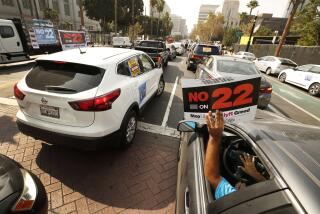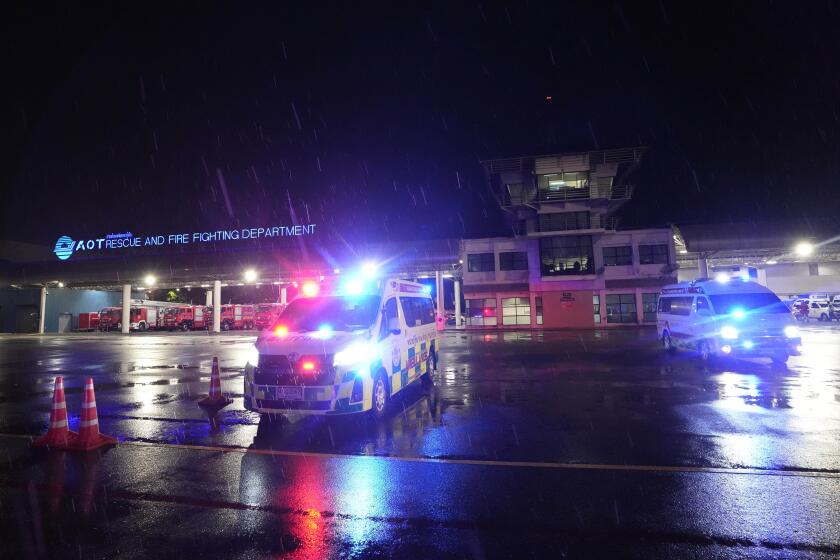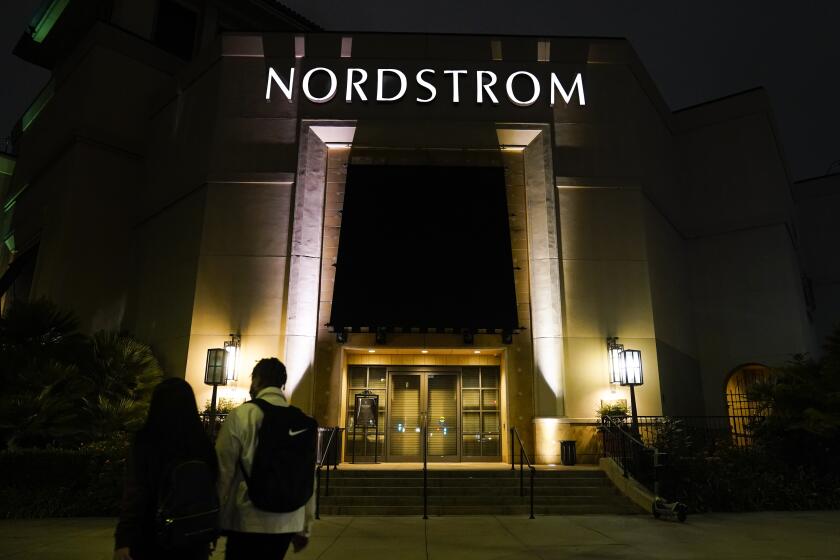Ballot Fight, Foreclosure Loom : New Cudahy Gaming Club Has Legal, Political Woes
When first proposed in 1981, the Silver Saddle Casino was to be the world’s largest poker club, flooding city coffers with $1.9 million each year from 100 gaming tables housed inside a cavernous, column-free pit area.
Last week, the long-awaited club quietly opened for business--albeit on a decidedly less grandiose scale.
The new facility has only four gaming tables, each one tucked in a corner of a cramped, box-shaped, cinder-block building in south Cudahy, a structure that once housed an automobile smog-control station.
Charles King, the club’s owner, acknowledges that his new gaming parlor hardly compares to the palatial gambling facility he originally planned. Nonetheless, King is quick to point out that he has bigger goals.
The gambling club promoter says he still plans to expand the building at Wilcox Avenue and Patata Street so it can accommodate 40 tables, a coffee shop and bar. By doing that, King hopes that the club--long the center of a political thunderstorm--will become a showpiece for Cudahy, a business pumping tens of thousands of dollars into the city each month.
Several obstacles, however, loom in the way.
Mid-March Deadline
A title company is attempting to foreclose on the club’s two-acre site because King’s firm, Tanlo Inc., has fallen more than $60,000 behind in payments. A mid-March deadline has been set for King to come up with the $541,000 needed to purchase the land, a lawyer for the firm that sold the property said.
In addition, a recently formed anti-gambling group, which wants to put the club out of business, has gathered enough signatures to put an initiative on the ballot May 13. The measure would rescind the ordinance, passed in December, 1982, that permits the council to license gaming clubs in Cudahy.
Such worries, however, were left behind last Friday as various city officials, patrons and supporters gathered to officially open the long-awaited club.
With mauve carpeting and felt-covered gaming tables, the facility has all the glitzy look of a casino--but none of the size.
“I call it elegance in miniature,” said Councilman Lynwood Evans, a longtime supporter of the club. “It’s very tastefully done.”
Popular Chinese Game
Three of the tables are set up for pai gow , a popular Chinese game played with numbered tiles; the fourth is for poker.
During its first days in business, the club attracted dozens of customers each evening, with up to three tables operating at one time, King said.
The four-table club will continue to operate while construction crews expand the structure to 25,000 square feet, King said. To finance the expansion, a limited partnership will be formed of investors holding a percentage ownership in the club, he said. King said his goal is to have the larger club open by the end of the year.
King said he opened the small club as much to reassure Cudahy residents that he was making progress as to start turning a profit.
Councilman John Robertson, a staunch opponent of the gambling club, said he feels King opened the club to help boost the political fortunes of Evans and Mayor Faye Dunlap, two club supporters who are up for reelection in April.
“What they promised the people and what they delivered on are two different things,” Robertson said.
Robertson also questioned how Tanlo Inc. would be able to avoid losing the property it bought from Hamilton Test Systems California Inc. in March, 1985. Foreclosure proceedings were begun in October after Tanlo fell $60,000 behind on its quarterly payments.
Charles Montgomery, assistant counsel for Hamilton Test Systems, said a public auction will be held in mid-March if Tanlo does not pay the entire $541,000 purchase price for the property.
King said he is confident that he can avoid foreclosure, but refused to say how he would accomplish that in the less than four weeks before the auction. “It’s being taken care of,” he said.
With the casino now in operation, King also predicted that the anti-gambling ballot measure does not pose a threat.
If the initiative passes, something he maintains is unlikely, the Silver Saddle Casino will be unaffected because the club will have been “grandfathered in,” King said.
As Evans and other card club supporters see it, approval of the ballot measure by the voters could backfire. By repealing the city’s gambling ordinance the city would have no legal basis for collecting operating fees from the poker club, Evans said. Those fees amount to a minimum of $10,000 a month and include a percentage of gross earnings above $200,000 a month.
“Chuck is open and operating and is grandfathered in,” Evans said. “If we do away with the ordinance, all it would do is take away the ability of the city to get any revenue.”
Robertson and other gambling opponents disagree.
Robertson contends that the council could revoke the club’s business license “at any time” because King violated the ordinance both by failing to meet construction deadlines and refusing to reveal his source of financing. Because of that, he said, the grandfathering of the club is irrelevant.
If the gambling ordinance is repealed by voters May 13, it would prohibit any other card club operators from applying for a gaming license, Robertson said.
City Atty. Steven Dorsey said the City Council could revoke King’s license, but that a strong case would have to be made against the casino.
Dorsey said that he has not determined whether repeal of the gambling ordinance would block the city from collecting fees from King. The council has not asked him to research that issue, he said.






